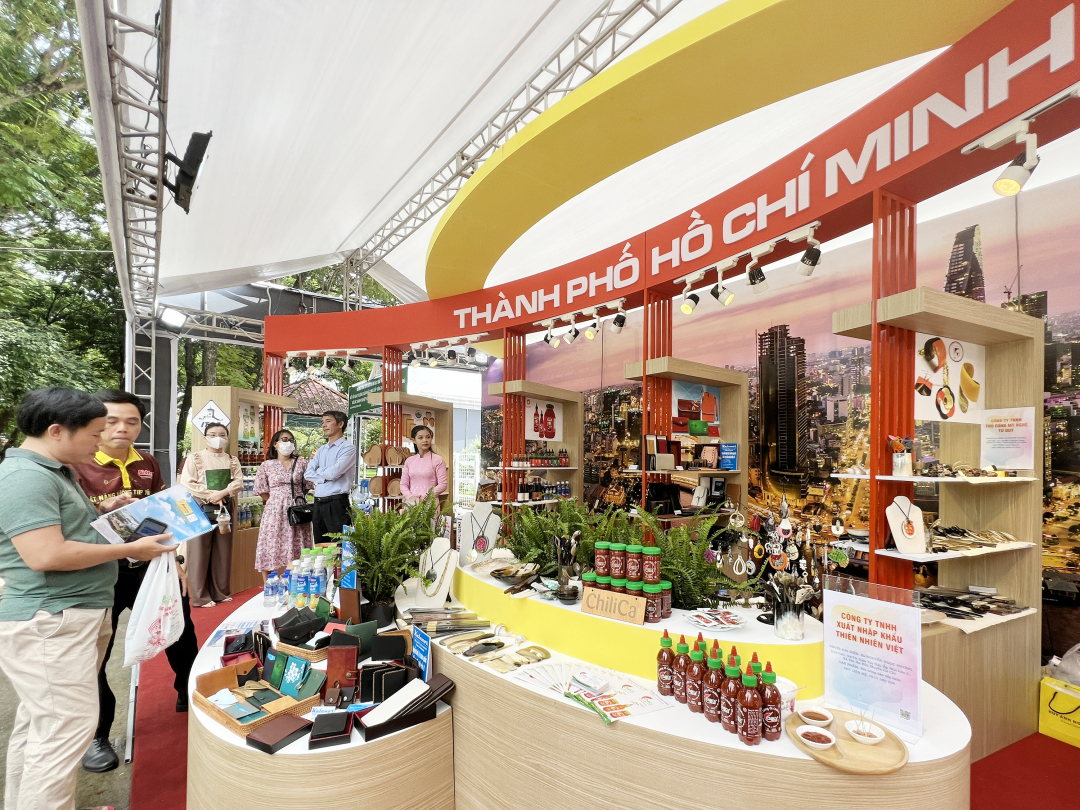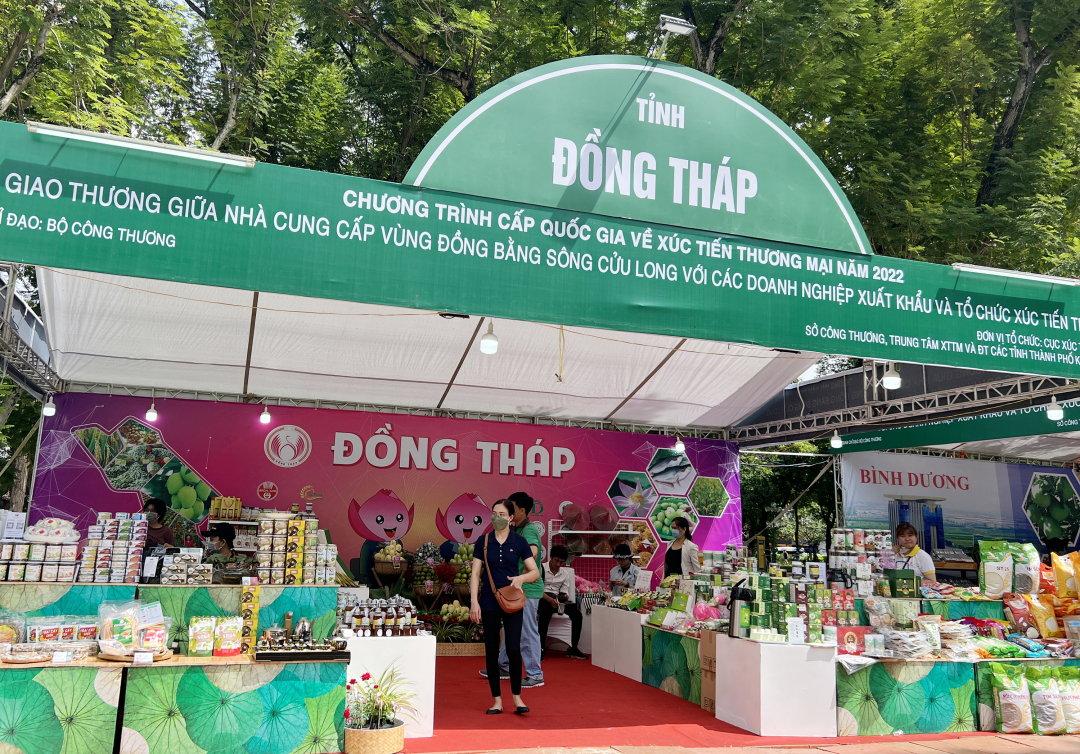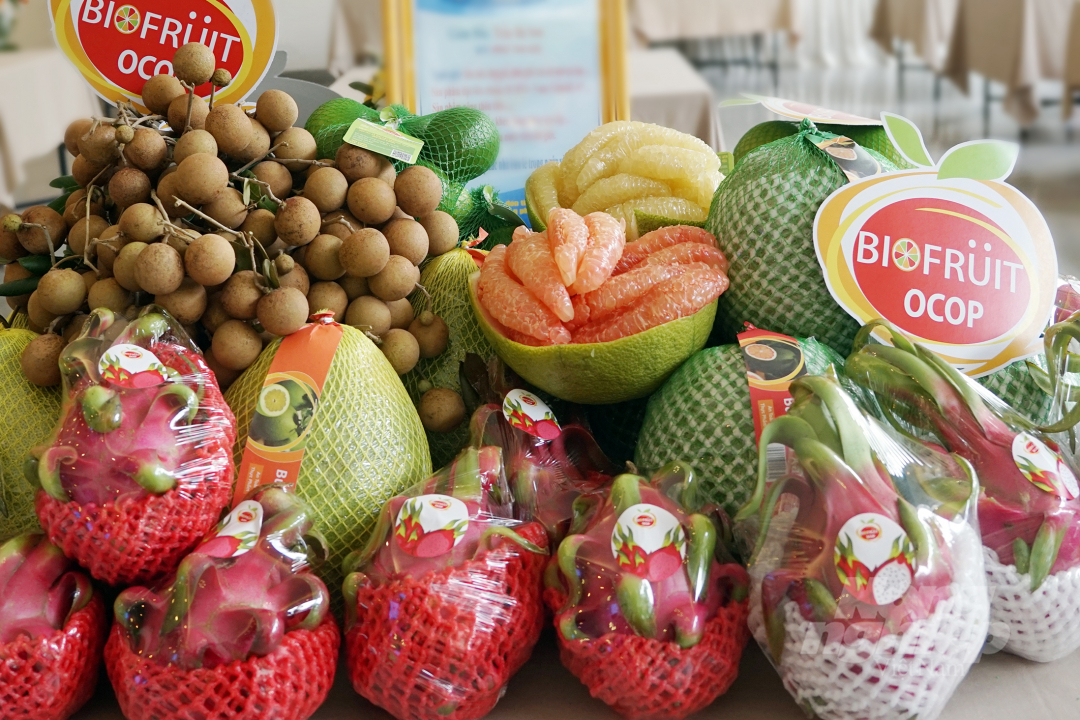June 19, 2025 | 10:09 GMT +7
June 19, 2025 | 10:09 GMT +7
Hotline: 0913.378.918
June 19, 2025 | 10:09 GMT +7
Hotline: 0913.378.918

Enterprises and cooperatives of Long An province participated in displaying typical agricultural products at the meeting between suppliers and exporters in Ho Chi Minh City. Photo: Nguyen Thuy.
In 2021, according to Dr. Arjen Roem, vice chairman of Eurocham's food, agricultural, and aquaculture business sector, Vietnam is the 31st biggest exporting partner to the EU and the 11th largest importing partner from the EU.
In 2021, Vietnam's exports to the EU reached USD 46 billion, an increase of 14 percent. According to Dr. Arjen Roem, the EU is presently the largest export market for Vietnamese agricultural goods, accounting for 14 percent of the total export value of key agricultural products.
Vietnam's main exports consist of tropical fruit, grains, and fresh and dried spices worth 869 million euros (39 percent); unroasted coffee and tea for 868 million euros (38 percent); and the remaining agricultural products consist of coffee, tea, rice, noodles, cakes, and biscuits. In 2021, wood and furniture exports to the EU totaled USD 14 billion, up 17% from 2020.
Vietnam sold about 22,500 tons of rice (USD 18 million) to the EU in the first quarter of 2022, a fourfold increase in volume and value compared to the same period in 2021. From 20 percent in the first quarter of 2021 to 28 percent in the first quarter of 2022, the percentage of Vietnamese pepper exports to the EU climbed.
After two consecutive years of decrease, pangasius and shrimp exports from Vietnam to the EU climbed by about 70 percent in the first two months of 2022, reaching a total of USD 190 million, as mentioned by Dr. Arjen. Moreover, Vietnam's tuna exports for the first two months of 2022 were USD 155 million, an increase of 82% compared to the same time in 2021.
According to Vietnam Customs, in the first half of 2022, despite fluctuations in the global situation, such as supply chain disruption, rising commodity prices, and an unstable logistics situation as a result of the Russia-Ukraine conflict, Vietnam's export turnover to the Netherlands grew by 29.6% year-over-year to reach USD 5.042 billion. Seafood climbed by 56,5 percent, vegetables and fruits by 21 percent, coffee by more than 300 percent, pepper by 75,6 percent, and rice by about 24 percent.
The Russia–Ukraine conflict has resulted in shortages, delays, and cost increases in the production lines of several worldwide enterprises. EU nations need an alternate source of grains and agricultural products.

"Vietnam can increase its position on the EU market to compete with Russian goods. Vietnam must capitalize on this chance to increase its market share on the EU market, where demand is rising," added Dr. Arjen Roem.
Dr. Arjen Roem said that Vietnam would only be able to sell 60,000 tons of rice to the EU market in 2021. Under the EVFTA Agreement, Vietnam must make full utilization of the rice export quota of 80,000 tons per year to the EU with zero percent tax. Vietnam should enhance exports of rice and other agricultural goods to this market at this time.
In addition, he mentioned certain roadblocks for Vietnamese exports to the EU due to EU's tight rules. Some potential Vietnamese product categories, including vegetables, rice, and processed goods, have not yet reached the number necessary for substantial purchases from EU retailers. The EU's demand is rising, but there are still few fruits and vegetables that match international export criteria for this market.
Vo Thi Ngoc Diep, Trade Counselor at the Vietnam Trade Office in the Netherlands, added that dry food products imported from Vietnam have continuously received warnings of ethylene oxide violations, forcing importers of this product to adopt a more cautious attitude and reduce the quantity of imported goods.

Fresh veggies have not been well-preserved during sea transport, thus importers are cautious to accept the risks associated with importing large quantities of this commodity by sea.
The EU has updated and enhanced the use of sanitary and quarantine procedures for imported agricultural goods, including feed and plant products, on an ongoing basis in recent years. Concurrently, improving the use of new socially responsible certification criteria related to environmental protection and sustainable development.
Dr. Arjen Roem said that in order for Vietnam to reclaim its worldwide position and reputation for agricultural and aquatic product exports, it must pay greater attention to delivering clear, open, and authentic certificates.
Strict regulations of origin are an additional obstacle for the export of Vietnamese goods to the EU.
Vietnam relies heavily on materials and inputs from non-EVFTA members. This prevents Vietnamese businesses from maximizing tariff-free advantages. " EVFTA is not a wand of magic. EVFTA faces obstacles not only from the quality and quantity of goods, but also from customer preferences and other criteria, such as working conditions and the restriction of child labor, consumer safety, environmental protection, factory standards, and manufacturing facilities among others.

All of these requirements strive to meet customers' expectations for a so-called "moral code." Vietnamese businesses must prepare and improve their production conditions and regulations, enhance their goods, and simplify their operations in order to fulfill the expectations of EU customers and raise their market appeal.
In addition, Dr. Arjen Roem proposes that Vietnamese enterprises update market information, including tariff preferences, food hygiene and safety, technological hurdles, rules of origin, and brand development.
The deputy chairman of Eurocham's food, agricultural, and aquaculture business sector said that if Vietnam does not use the chance to take the lead in trade relations, it would face competition from Southeast Asian neighbors in the future. Because Singapore has already signed FTAs and the EU is now negotiating FTAs with other nations in the area, such as the Philippines and Indonesia, FTAs have been signed by Singapore. These nations directly compete with Vietnam in the export of commodities to the EU.
Translated by Linh Linh
/2025/06/17/2344-1-131758_261.jpg)
(VAN) Amid tariff risks and growing trade barriers in the U.S. market, Australia is emerging as a promising destination to sustain the growth momentum of Vietnam's shrimp exports.
/2025/06/17/2013-1-nongnghiep-112009.jpg)
(VAN) This notable growth trend reflects the global taste for fresh, nutritious fruits and the expanding use of lychees across various sectors.

(VAN) The political and cultural insulation of Japan’s beloved grain is falling apart, and experts warn the country’s relationship with the staple will have to adapt.

(VAN) Noting risks, report examines impacts of avian influenza, changing trade patterns since 2022, fish fraud, and shipping industry’s net-zero goals.

(VAN) Mr. Tran Quang Bao, General Director of the Forestry and Forest Protection Department, met and worked with the International Wood Products Association to promote cooperation in the field of timber trade.

(VAN) China's outbound shipments of rare earths in May jumped 23% on the month to their highest in a year, though Beijing's export curbs on some of the critical minerals halted some overseas sales.

(VAN) To sustain capital flow, administrative reform alone is not enough; what farmers truly need is an ecosystem where both government and businesses grow together in support.